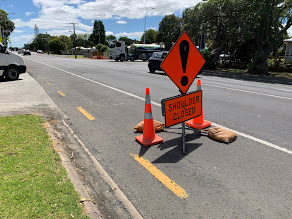Council adopts two new bylaws
Two new bylaws adopted by the Council last week will improve road safety in the district and clarify rules for customers around treated water supplies.
The Council adopted the new Treated Water Supply Bylaw and Vehicle Crossings Bylaw during its Thursday meeting last week. Both new bylaws came into effect on Saturday 25 September.

Two new bylaws adopted by the Council last week will improve road safety in the district and clarify rules for customers around treated water supplies.
The Council adopted the new Treated Water Supply Bylaw and Vehicle Crossings Bylaw during its Thursday meeting last week. Both new bylaws came into effect on Saturday 25 September.
The new Treated Water Supply Bylaw applies to the eight treated water schemes managed by the Council. These supply homes and businesses at Kaikohe-Ngāwhā, Kaitāia, Kawakawa-Moerewa, Kerikeri-Waipapa, Ōkaihau, Ōpononi-Ōmāpere, Paihia-Ōpua-Waitangi, and Rāwene-Ōmanaia. The bylaw does not apply to privately-owned water schemes, which are regulated by national legislation.
The new bylaw replaces the previous Water Supply Bylaw. It reaffirms most of the conditions for the supply and use of treated water contained by the previous bylaw, including:
- Defining the point of water supply to customers
- Council responsibilities for supply
- Council obligations when supplies are interrupted during maintenance or emergencies
- Council powers to apply water restrictions
- Use of water meters to ensure fair and accurate billing.
New provisions in the bylaw relate to digging or building near water mains to better protect lines from damage.
Strategy and Policy Committee Chair, Rachel Smith, says the supply of treated water is a key service that the Council provides to many of the district’s urban residents, but also to rural households that rely on treated water to refill rainwater tanks during prolonged dry periods. Commercial operations also use treated water from roadside hydrants.
“Like the previous bylaw, the new Treated Water Supply Bylaw sets out exactly what the Council’s obligations are to our many water customers. However, the new bylaw also clarifies technical language, simplifies the definition of treated water, and explains customer rights to object to water supply decisions.”
She adds that the new bylaw is not related to the Government’s review of three waters. “That is a national examination of treated water supplies, wastewater and stormwater.”
The second new bylaw focuses on the construction of vehicle crossings that link the road to peoples’ driveways.
Councillor Smith says the Vehicle Crossings Bylaw aims to protect the safety of road users by requiring all vehicle crossings to be fit-for-purpose, safe, and to meet Council engineering standards. The new bylaw details the approvals and inspection process required to ensure vehicle crossings are constructed to standard. It also allows the Council to require substandard crossings be removed, repaired, or rebuilt.
She says that by setting minimum standards for crossings, the bylaw will ensure Far North transport networks are accessible and safe for everyone, regardless of their chosen mode of transport.
Poorly constructed and maintained crossings can become a hazard to motorists and pedestrians through road scouring and damage to drains. She says the new bylaw will play a significant role in improving the whole roading network.
Copies of the two new bylaws are available on the Council’s Let’s talk about bylaws webpage or can be accessed at a Council service centre or library.
Tags: News story

